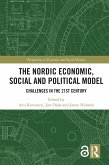The Nordic Model is the 20th-century Scandinavian recipe for combining stable democracies, individual freedom, economic growth and comprehensive systems for social security. But what happens when Sweden and Finland - two countries topping global indexes for competitiveness, productivity, growth, quality of life, prosperity, and equality - start doubting themselves and their future? Is the Nordic Model at a crossroads?
Historically, consensus, continuity, social cohesion, and broad social trust have been hailed as key components for the success and for the self-images of Sweden and Finland. In the contemporary, however, political debates in both countries are increasingly focused on risks, threats, and worry. Social disintegration, political polarization, geopolitical anxieties, and threat of terrorism are often dominant themes. This book focuses on what appears to be a paradox: countries with low income differences, high faith in social institutions, and relatively high cultural homogeneity becoming fixated on the fear of polarization, disintegration, and diminished social trust. Unpacking the presentist discourse of "worry" and a sense of interregnum at the face of geopolitical tensions, digitalization, and globalization, as well as challenges to democracy, the chapters take steps back in time and explore the current conjecture through the eyes of historians and social scientists, addressing key aspects of and challenges to both the contemporary and future Nordic Model. In addition, the functioning and efficacy of the participatory democracy and current protocols of decision-making are debated.
This work is essential reading for students and scholars of the welfare state, social reforms, and populism, as well as Nordic and Scandinavian studies.
The Open Access version of this book, available at www.taylorfrancis.com, has been made available under a Creative Commons Attribution-Non Commercial-No Derivatives 4.0 license.
Historically, consensus, continuity, social cohesion, and broad social trust have been hailed as key components for the success and for the self-images of Sweden and Finland. In the contemporary, however, political debates in both countries are increasingly focused on risks, threats, and worry. Social disintegration, political polarization, geopolitical anxieties, and threat of terrorism are often dominant themes. This book focuses on what appears to be a paradox: countries with low income differences, high faith in social institutions, and relatively high cultural homogeneity becoming fixated on the fear of polarization, disintegration, and diminished social trust. Unpacking the presentist discourse of "worry" and a sense of interregnum at the face of geopolitical tensions, digitalization, and globalization, as well as challenges to democracy, the chapters take steps back in time and explore the current conjecture through the eyes of historians and social scientists, addressing key aspects of and challenges to both the contemporary and future Nordic Model. In addition, the functioning and efficacy of the participatory democracy and current protocols of decision-making are debated.
This work is essential reading for students and scholars of the welfare state, social reforms, and populism, as well as Nordic and Scandinavian studies.
The Open Access version of this book, available at www.taylorfrancis.com, has been made available under a Creative Commons Attribution-Non Commercial-No Derivatives 4.0 license.
Dieser Download kann aus rechtlichen Gründen nur mit Rechnungsadresse in A, B, BG, CY, CZ, D, DK, EW, E, FIN, F, GR, HR, H, IRL, I, LT, L, LR, M, NL, PL, P, R, S, SLO, SK ausgeliefert werden.









